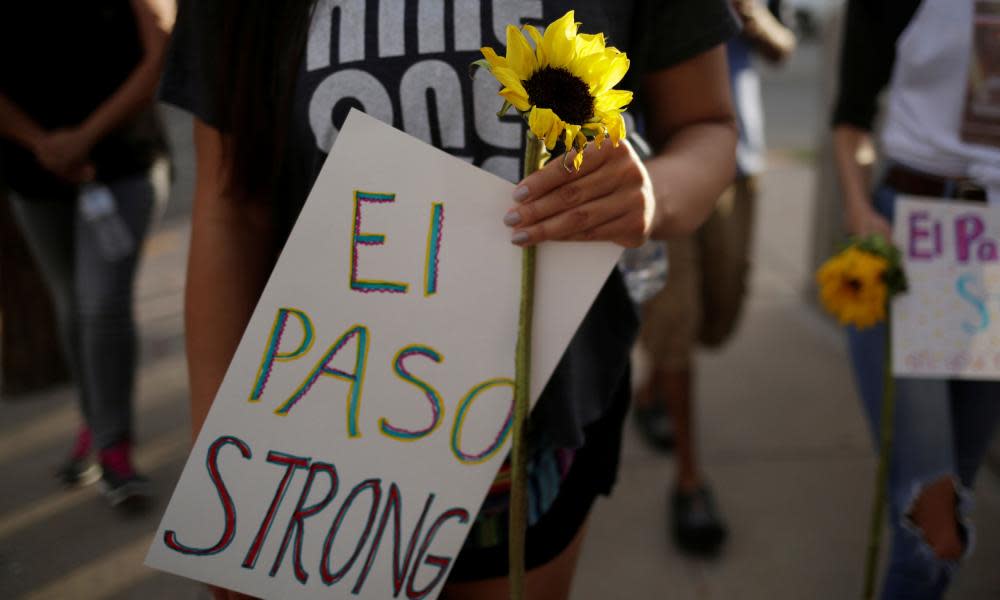Future of far-right 8chan in doubt as key protections axed after El Paso attack

8chan, the extremist message board used by three alleged killers in the past six months to distribute racist and white nationalist manifestos prior to mass shootings, lost the protection of an important security service provider when Cloudflare announced in a blogpost the company would be “terminating 8chan as a client”.
Cloudflare’s decision on Sunday may jeopardize 8chan’s ability to remain on the open web in the near term, because the company has been protecting 8chan from distributed denial of service (DDoS) attacks, and the site is a likely target for internet vigilantes.
It is also represents a complete reversal of Cloudflare’s position from less than 24 hours earlier, when the co-founder and chief executive, Matthew Prince, defended his company’s relationship with 8chan as a “moral obligation” in an extensive interview with the Guardian.
Related: 8chan: the far-right website linked to the rise in hate crimes
“The rationale is simple: they have proven themselves to be lawless and that lawlessness has caused multiple tragic deaths,” Prince wrote in a blogpost announcing the decision. “Even if 8chan may not have violated the letter of the law in refusing to moderate their hate-filled community, they have created an environment that revels in violating its spirit.”
But Prince reiterated his belief that the action by Cloudflare will not actually create more safety or reduce hatred on the internet.
“While removing 8chan from our network takes heat off of us, it does nothing to address why hateful sites fester online,” he wrote. “It does nothing to address why mass shootings occur. It does nothing to address why portions of the population feel so disenchanted they turn to hate. In taking this action we’ve solved our own problem, but we haven’t solved the Internet’s.”
8chan responded to the news in a statement posted on Twitter: “There might be some downtime in the next 24-48 hours while we find a solution (that includes our email so timely compliance with law enforcement requests may be affected).”
Users on the site flooded threads to discuss the threat to 8chan – with many expressing confidence that the site would be closed – in comments dominated by the message board’s culture of racist obscenities and hate speech.
The controversy over Cloudflare, which played a role in keeping 8chan online but neither hosted nor promoted its content, is just the latest example of the struggles faced by US technology companies to address the spread of potentially dangerous content that is nevertheless legal.
For decades, American technology companies maintained a laissez-faire approach toward user-generated content, even as social media companies including Facebook and YouTube-crafted algorithms that amplified bigoted speech to massive audiences. In recent years, as evidence has mounted that online incitement can lead to real-world violence, from Myanmar and Charlottesville to Christchurch and El Paso, pressure has mounted on the various companies to reconsider their approaches.
Cloudflare has long sought to remain apart from the content battles that have consumed social media platforms, considering itself a neutral provider of infrastructure rather than a platform or publisher.
But the company found itself under uncomfortable public scrutiny in 2017 when ProPublica reported on its role in protecting the extremist neo-Nazi hate site, the Daily Stormer. Later that year, after the deadly Unite the Right rally prompted a belated industry-wide purge of some of the most extreme white supremacist groups from various platforms and services, Prince decided to cancel Cloudflare’s support for the Daily Stormer.
Related: Parents killed in El Paso shooting while protecting their baby from gunfire
At the time, Prince expressed ambivalence about his decision, telling employees in an email: “This was an arbitrary decision. I woke up this morning in a bad mood and decided to kick them off the internet.”
He called for a public debate about how and where content moderation should take place within the various layers of services that make up the internet, from social media platforms at the top to internet service providers at the bottom. “I am deeply uncomfortable with the decision we made,” he told the Guardian at the time. “It doesn’t align with our principles.”
On Saturday, Prince reiterated those principles, which he said were not driven by the free speech absolutism that has long been prevalent among technologists, but derived from a sense of obligation to monitor activity on dangerous parts of the web and cooperate with law enforcement.
“If I could wave a magic wand and make all of the bad things that are on the internet go away – and I personally would put the Daily Stormer and 8chan in that category of bad things – I would wave that magic wand tomorrow,” Prince said. “It would be the easiest thing in the world and it would feel incredibly good for us to kick 8chan off our network, but I think it would step away from the obligation that we have and cause that community to still exist and be more lawless over time.”
“There are lots of competitors to Cloudflare that are not nearly as law abiding as we have always been,” he said. “The minute that someone isn’t on our network, they’re going to be on someone else’s network.”
Indeed, the Daily Stormer was briefly forced on to the dark web when it lost Cloudflare’s services, but has since returned to the open internet. On Saturday, the site published the full text of the El Paso suspect’s manifesto.

